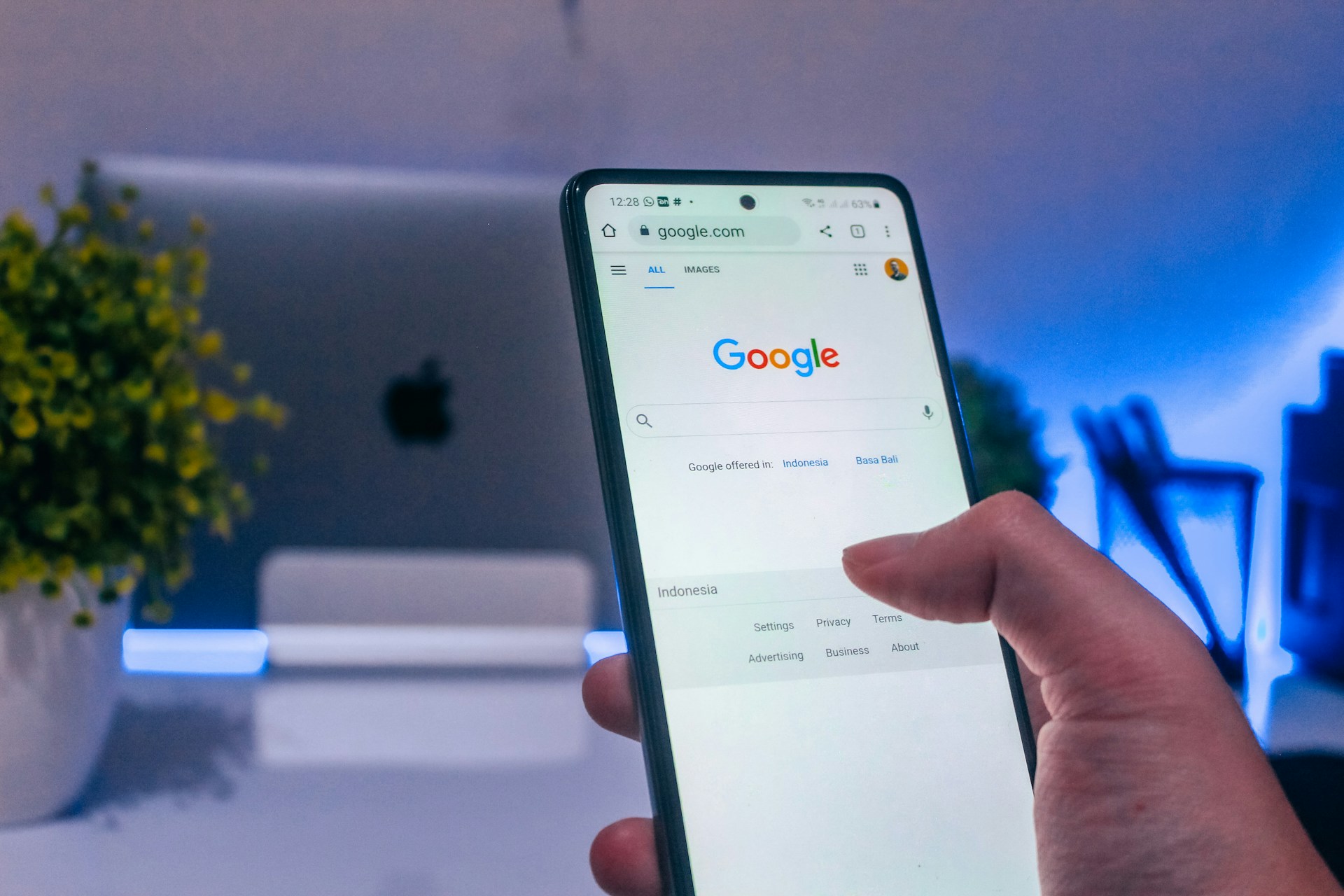In short, SEO is about making your website more visible in search results.
For instance, if you go to Google and type in the phrase “Bitcoin hoodie” then the websites that appear on the first page of Google (aside from the ads) have most likely used SEO to get there.
Optimizing your website for SEO can seem daunting at first, but there are some simple steps you can take to give yourself the best chance of ranking highly on search engines.
Does SEO Still Matter?
There are many ways to get found online. Social media, paid advertising, sponsorship, and much more. Is it still worth spending time and money on SEO?
The truth is Google is still the number one most visited website in the world. In February this year in the US, Google received 17 billion visits which are seven times more than Facebook.
In fact, this is more than Facebook, Twitter, and Amazon combined.
Google is the first place people go when searching for anything online, which is why you can’t afford to ignore it when marketing your business.
What About Google Advertising and PPC?
There are many forms of Google Advertising but let’s look at the difference between Google search ads and google organic search to keep things simple.
When you type in a Google search, you will see several paid and some organic listings.
The paid ads are at the top, and the organic listings are below. You might assume that this means the paid results get more clicks… you’d be wrong.
When comparing organic listings vs. paid listings, it’s quite clear to see what gets more clicks in Google search results:
Organic search: 77.94%
Paid search: 22.06%
This means people who use Google Search clearly prefer to click the organic search results vs. the paid results. If you rely only on paid advertising, you could miss out on 77.94% of the traffic.
How Can You Use SEO to Get on the First Page of Google?

Below, we break down nine things you can do to optimize your website for search engines. These SEO tips will help you improve your search engine rankings if:
- Someone searches for products and services that you offer
- Someone searches for questions related to your industry
People search in many different ways, but the steps below will help you optimize your website to boost the number of keywords your rank for and push you higher up in search results for relevant keywords.
1. Create a page for each of your services
Google doesn’t rank websites on the first page of Google. They rank pages.
Google wants to see that you have dedicated pages for each of the main search terms you want to rank for. See for yourself.
Go to Google and type in a search query. Try “Bitcoin Energy Consumption,” “Proof of work,” or “Bitcoin consulting.”
What do you see?
All the results from these searches lead to internal pages discussing these keywords. You will hardly ever see a website’s homepage rank highly.
This is why you need internal pages on your website that provide value. Your competitors will be doing this, so you must do it too.
Think about all of the key services you offer and create unique pages for each product or service. Some companies like to keep their website quite basic and often group services together on a single page. Unfortunately, this isn’t going to be enough if you want to rank highly for different keywords.
2. Keyword research
Keyword research might sound scary, but it isn’t.
If you follow a simple process, you can achieve better results than most of your competitors.
Most websites don’t bother with keyword research. They launch a website with a few pages and hope that people will find it. This doesn’t work.
Keyword research for Bitcoin companies
Step 1 – Write down 10-20 words and phrases that you think people might type into Google to find what you offer. Think about your services, your products, and what you help people achieve (Maybe even your brand name if you’re well known)
Step 2 – Then, use a keyword research tool to confirm people do search for these words and phrases. Use a tool like KW Finder or SEMrush to check on the popularity of these search terms and make a note of the average monthly search volume.
Step 3 – Look for any other related search terms that pop up during this process. Keyword research tools will often show you far better keywords than what you initially thought. Make a note of these extra words and phrases along with their search volume.
Step 4 – Group them together. When you create new web pages it’s a good idea to have a number of keywords related to each search you offer or keyword you’d like to rank for. Try to collate lots of keywords for each of your main services. For example, if your main keyword is “Bitcoin mining equipment” you might have a list that looks like this…
- bitcoin mining machine price
- bitcoin mining machine for sale
- bitcoin miner profitability
- bitcoin mining calculator
- bitcoin mining machine profit
- bitcoin mining software
- best bitcoin mining machine
When you do this, it means you have the option to include these search terms throughout your web pages. The more keywords and data you collect, the more keywords you can rank for and traffic you can generate.
3. Add great content on every page
Once you have collected a list of popular keywords and have separate pages for each service, now’s the time to create content for those pages.
Google likes to see that you have quality content on your pages so they feel comfortable listing you on the first page of Google.
But how do you know if your content is good “quality”?
You can do a few things to show Google that your pages are valuable and relevant. Here are two of them:
- Quality and quantity are linked. Generally speaking, the more words on the page, the longer and more informative the page is likely to be. Obviously, you don’t want to write unnecessary words, but the chances of ranking a 300-word article or page on the first page of Google are slim to none. Most of the results on the first page of Google are well over 1000 words.
- Use your keywords throughout the page. You should already have a list of keywords that you can use when writing the content for your pages. Don’t ignore this information. Try to naturally weave the keywords within your copy and touch on as many of these points as possible so you can rank highly for more keywords.
4. Use keywords in your headings
Carefully consider the headings on your pages. Search engines look at the words and phrases you use in your headings to find out what keywords you want to rank for.
You must try to include your keywords within the main heading of the page, along with the subheadings throughout.
Each page on your website should have the following:
- One main heading (H1 tag) that includes your main keyword for that page
- Multiple subheadings (H2 tags) that include extra keywords related to your main keyword
If the page has quite a lot of content, you will naturally want to break up the content with subheadings, which is your chance to include lots of relevant keywords.
5. Optimize your URL for SEO
When you create new pages on your website, you need to create a unique URL where that content will live. For instance, if your new page is about “Historical Bitcoin Prices” your page URL might be yourwebsite.com/historical-bitcoin-prices
The words you include within your URL have a big impact on your success, so follow these rules to create search engine-friendly URLs:
- Include your main keywords
- Use a hyphen to separate the words
- Keep it short (2-5 words is good)
6. Internal linking
As you create new web pages, you will want to link to other pages on your website. Website visitors like to be able to navigate through your website easily, and by including relevant links within your content, you can make it super simple for everyone.
It’s not just website visitors who benefit from internal linking. Search engine crawlers like to understand which content links to which content. This makes it easier to crawl your website and find relevant pages or posts they can display in search results.
Follow these guidelines when creating good internal links:
- Use keywords within your hyperlinks, e.g., use “Bitcoin price” rather than “Click here”
- Link to other service pages as well as blog articles
- Include multiple links throughout your page wherever it’s valuable
7. Optimize your images for search engines
Images and graphics are a big part of a website. Without them, we’d all have very boring-looking websites. However, images need to be optimized properly for search engines if you want to rank highly in search results.
- Reduce the file size – Use a tool like TinyPNG to rescue the file size of your images before uploading them to your website. If you don’t, your images might be too large and affect your page loading speed.
- Include keywords in your filename – When you save your images, try to use keywords within your file name. Some images look like this “img_05743.jpg” when they should look like this “bitcoin-wallet-icon.jpg”
- Add alternative text to your images – When you upload images to your website, always remember to add alternative text (ALT text). That way, you can tell search engines what the image is and what keywords you want to rank for, e.g., Bitcoin Wallet Icon
8. Optimize your metadata
Whenever you create a new page or post on your website, you will be able to add a “Title Tag” and a “Meta Description” to help Google understand what that page is about.
- A title tag is the large blue text that appears on search results next to each listing.
- A meta description is the grey text that appears below the URL on search results
Here are a few things you can do to optimize your title tag and meta description:
- Include your keywords. It’s good practice to include your main keywords within these sections for congruency as it will increase the number of clicks you get
Be aware of character limits. You only have a 55-character limit for your title tag and a 155-character limit for your meta description. If you include more than this, Google will cut your information short.
9. Create in-depth help blog content
From experience, this is the most effective way to get better search engine rankings and get more website traffic.
Create in-depth blog content that focuses on a specific search query. When you do this, you can include EVERYTHING we’ve mentioned above at the same time.
- If you want to rank for “Best Bitcoin Wallet,” you can write an in-depth article about it.
- If you want to rank for “Bitcoin exchanges,” you can write an in-depth comparison piece.
- If you want to rank for “Bitcoin art,” an article will help you get there.
Creating unique, in-depth, and helpful content is the best way to show search engines that you have the best article for that particular search term.
Obviously, creating content like this takes time.
This is why our clients hire us to do it for them. At Riseup Media, we create in-depth blog content for Bitcoin companies to help them rank highly for their main keywords.




